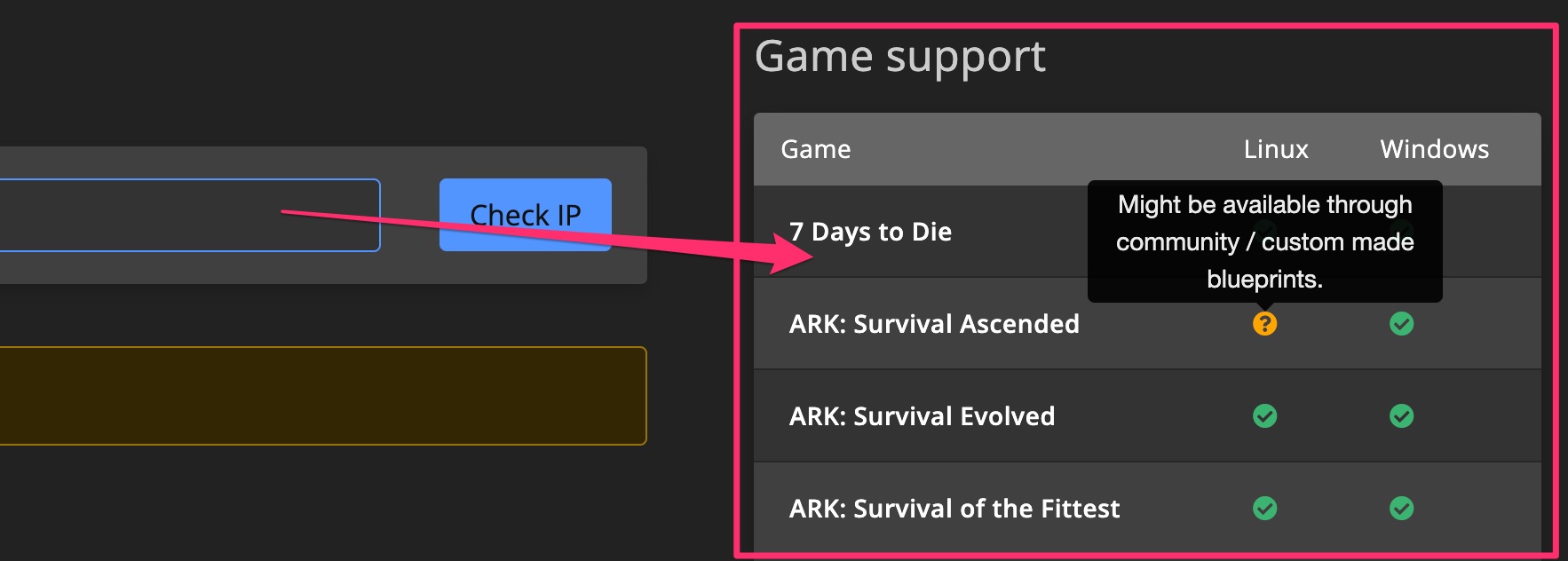Requirements & tips
Here are the key requirements and helpful tips for hosting reliable, high-performance game servers using DediConnect.
Supported Operating Systems (OS)
DediConnect supports the following operating systems. Make sure the language on the machine is set to English:
- Debian 11
- Debian 12
- Ubuntu 22.04
- Windows Server 2019 (Standard & Datacenter editions)
- Windows Server 2022 (Standard & Datacenter editions)
Windows machines must run the GSA install script before they can connect to DediConnect.
Supported games
For up-to-date information about which games are supported per OS, visit the Connect DediConnect machine page.
If your game isn’t listed, it might still be available through custom blueprints or the marketplace.

Hardware specifications
- Processor: 3.5GHz or higher (AMD or Intel)
- RAM: 64GB or more
- Disk: 500GB or more (SSD or NVMe only, no HDDs!)
C: usageWhile game servers can be installed on alternative drives, critical files like game cache, Docker images, and required software are only supported on the C: drive.
Root / Administrator access
DediConnect needs full system access Root (Linux) or Administrator (Windows) to optimize the machine for game server hosting. There is currently no workaround for this.
Network ports
These are the ports GSA may use to communicate with your machine and to host game servers and related services:
DO NOT manually open these ports on your Windows or Linux firewall. GSA handles all port management for you.
If you’ve rented a machine from a data center, there’s no need to configure ports at all.
Required
- 21
FTP - 22
SSH - 2456 - 2600
- 7777 - 7900
- 11000 - 11999
Passive FTP - 23000 - 23300
- 27015 - 27300
- 30000 - 30300
- 37015 - 37215
- 40000 - 40400
Optional
- 8384
Required for Syncthing
For extra security, consider allowing access to key ports (21, 22, 8384, 11000 - 11999) only for Platform IPs.
Finding the right hardware
Join our Discord to speak with experienced users who can guide you.
When asking for help, include:
- Your experience level
- The game(s) you host
- Number of game servers
- Estimated number of players
Processor / CPU
Most games benefit from higher clock speeds (GHz) rather than more cores. CPUs running below 3.5GHz may lead to lag or rubberbanding.
Reserve at least one thread per game server.
You can look up your processor’s core and thread count online.
To host 8 game servers, you'll need at least 8 threads. Ideally, reserve 2 extra threads for system tasks.
Popular hardware
Here are some commonly used CPUs for DediConnect:
- AMD Ryzen 5 3600
- AMD Ryzen 7 7700
- AMD Ryzen 9 7900
- AMD Ryzen 9 7950X3D
- AMD Ryzen Threadripper 2950X
- Intel Core i7-6700
- Intel Core i7-7700
- Intel Core i9-9900K
We recommend using CPUs with only P-cores (performance cores). CPUs with E-cores (efficiency cores) are supported but not ideal for game server hosting.
Memory / RAM
Game servers store save data in memory, increasing RAM usage. If memory runs out, servers crash.
Most games require 4–10 GB of RAM per server (average is ~7 GB).
For 8 game servers, plan for at least 56GB of RAM (8 x 7 = 56GB). Add ~4GB for system tasks, totaling 60GB.
Disk space
Fast storage is essential, use SSD or NVMe. Avoid HDDs entirely.
Most game servers need around 30GB of disk space.
For 8 game servers, you'll need at least 240GB (8 x 30 = 240GB). Add 100GB for the system, totaling 340GB.
DDoS protection
DDoS protection is a must for popular communities. Smaller or friend-only servers generally don’t need it.
Practical tips
Fresh install
For best results, install DediConnect on a freshly installed system, without any additional software. This avoids conflicts with programs not managed by GSA.
Spread across multiple machines
In some cases, using several smaller machines is more cost-effective than one large one.
It also lets you match the right hardware to each game. Use high-performance machines for popular servers, and lower spec ones for smaller maps or less active servers.